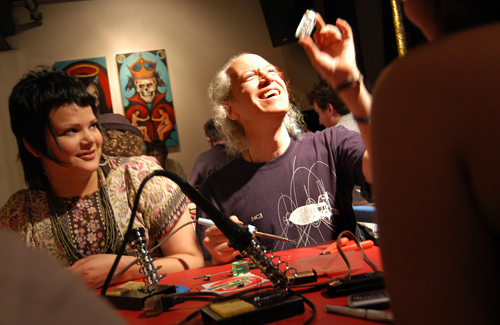
In the eyes of most people, hackers are bad guys – high-tech outlaws who want to steal our bank account numbers and shut down government Web sites. But in the eyes of Mitch Altman, hackers are “some of the most wonderful, helpful, creative people in the world.”
“Hacking, the way I describe it, is learning about a technology, exchanging it, and sharing it,” said Altman, who is an Artist in Residency this month at AS220, the nonprofit community arts center in downtown Providence. As Altman sees it, hackers are like accountants – there are good ones and bad ones – but they perform an important service by finding and demonstrating vulnerabilities in the technologies we depend on.
Altman himself is a hacker extraordinaire. An electrical engineer by training, he is best known as the inventor of TV-B-Gone, a $20 electronic keychain device that is programmed with the codes for thousands of TVs and thus can turn off almost any set – a blessing for those exhausted by the numbing drone of CNN at an airport terminal or a Laundromat. He also writes for the do-it-yourself electronics magazine Make, and was invited to spend August in Providence by local tech guru Brian Jepson, an AS220 board member and an editor at Make.
At AS220, Altman, 51, is spreading his message of technological empowerment, trying to take the mystery out of electronics by teaching workshops where attendees learn to solder simple devices.
“The main thing I hope is that people will have confidence to build cool things on their own,” he said. “There’s no mystery to it. No matter how complex, it’s a whole bunch of simple stuff put together.”
At his workshops this month, Altman is teaching how to make three devices: a TV-B-Gone; The Brain Machine, which plays a sequence of frequencies using blinking lights and sounds to help people sleep; and a “Trippy RGB Light,” a red, green and blue LED light similar to a single computer pixel. Altman shows his students how to solder one electrical connection, and then they can follow his directions at their own pace.
“Anyone can do this,” he said. “By the time they’re finished, electronics isn’t so scary to them anymore.”
Altman is one of the many established artists in various disciplines who have come to AS220 as a visiting artist in residency since the program started eight years ago. “The whole idea is to make connections and inspire some of the people who are living here,” said Shawn Wallace, the former managing director of AS220, who now heads AS220 Labs. “It really has built up a network.”
Wallace said Altman is a particularly good fit for AS220 right now, because the group’s artists are trying to build side enterprises to help support the organization. “Mitch is sort of a walking cottage industry,” Wallace said.
Altman started taking things apart at a young age, and was fascinated to find that the devices he tinkered with were almost always simpler than he expected. After graduating and finding cubicle life a poor fit, Altman became a consultant to high-tech manufacturing companies.
In 2003, however, he quit consulting “to try and just do what I loved,” he said. It was then that he finally found time to develop TV-B-Gone, an idea he had been mulling for over a decade.
His TV zapper touched a nerve – The New York Times, Wired.com, National Public Radio (NPR) and many other outlets publicized the invention – and Altman has sold tens of thousands of them since the device went on sale in October 2004. He now lives off the income from TV-B-Gone and devotes his time to teaching and volunteering.
The perfect demonstration of the device came when Altman was at the Fox Sports SkyBox at Chicago O’Hare Airport. Surrounded by 30 television sets, Altman tapped his TV-B-Gone and, within a minute, they were all off.
“Nobody noticed,” he said. •












